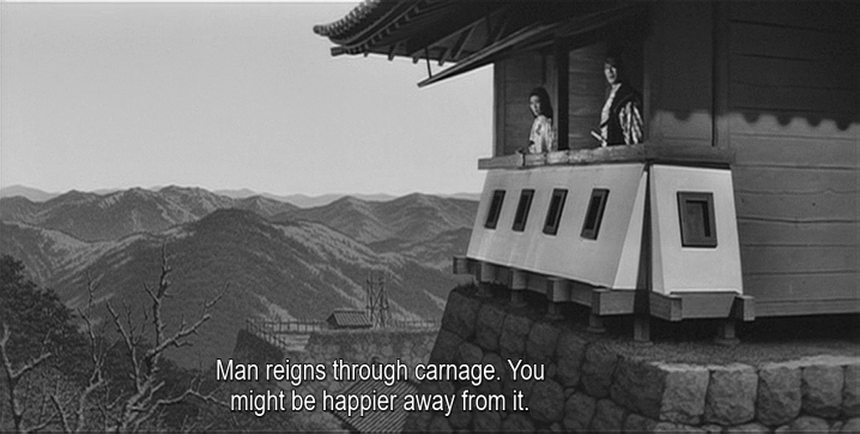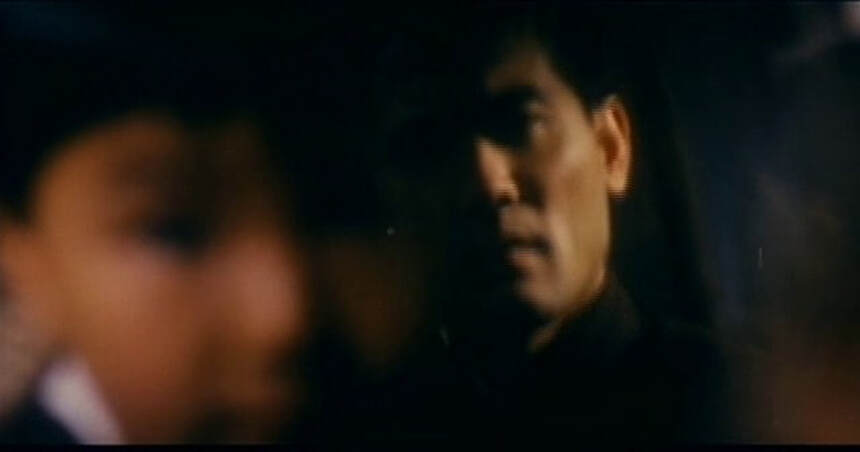|
An uncompromising vision of the barbarism intrinsic to living in this epoch, Inoue's Jidaigeki film takes aim at the valorization of the samurai and the absolute authoritative structures which they serve to deliver a subversive deconstruction of the shogunate ethos that ultimately aligns quite well within an anarchist philosophical framework. Power and strength are the only currency of value in a militaristic world built on conquest, and Inoue's Jidaigeki film is a wicked take on the Kagemusha tale that finds great utility in its examination of symbols, images, and illusions, detailing how in a strict-hierarchical social order power itself is absolute but vacuous - everything is malleable to abject authority. Pre-dating Matsumoto's Demons by a decade, Inoue's The Third Shadow has many differences but it shows the same penchant for unsavory brutalism and abject nihilism in its portrayal of this era. I have no idea if there is any connectivity between the two films, but it just feels like it may have been instructive or influential to Matsumoto, with both films capturing how militarism and barbarism are simply put antithetical to the sanctity of life. The journey of our main protagonist is one of dual deception, the allure of power from being a samurai pulls him from his fields, and his deceptions, whether out of necessity for survival or not, lead him closer and closer to power but ultimately ruin. A grand tragedy amongst a sea of unwavering and uncompromising subjugation and brutality
0 Comments
A sumptuous, beautifully conceived melodrama, Kwan's Red Rose White Rose is an ingenious formal construction that takes its novelistic source material to heart while managing to never feel restricted by it. Red Rose White Rose is a relatively straightforward melodrama dealing with desire and repression but the directorial vision on display here may be Kwan's finest achievement. Kwan finds great utility in the dualistic structure, employing two distinct aesthetics rooted in impressionism that aim to exude the underlying emotions on display. What transpires is a story of existential or spiritual concerns, and Kwan draws from abstract imagery and impressionistic lighting to convey the gravitas of this battle between internal impulse and external expectations, detailing the kaleidoscope of emotions that define us but also how they can often be in contention with not only our internal logic but social constructions related to expectations, duties, and obligations which are necessary to living in the communal nature of our world. Vividly expressing the intangible nature of love and how it often can conflict with various external norms or expectations, Red Rose White Rose ultimately doesn't seem to suggest it has the answers to such complexities. It shows how this man's obligation and duty to others drives him into unrequited love but does it condone this ultimately? I don't think so because what Kwan seems to suggest is living is not a zero-sum game, it's one merely of choices and conviction. Regret, pain, joy, love, and melancholy are inevitable so in one respect following one's desires solely is a bit naive when we ultimately should acknowledge the multitudinous forces on display in which every individual decision is influenced by external factors, whether they be social, economic, cultural or political. In a sense, Red Rose White Rose in its dualistic structure ultimately rejects binary classifications entirely. Would really love to see this get a 4k restoration, it is such a beautifully constructed film.
|
AuthorLove of all things cinema brought me here. Archives
June 2023
|


 RSS Feed
RSS Feed
